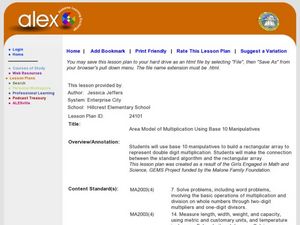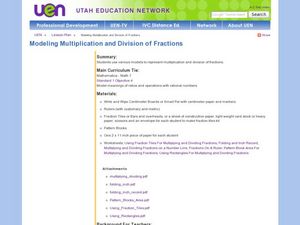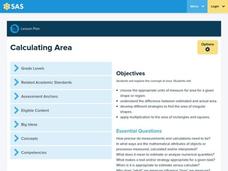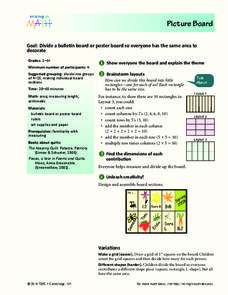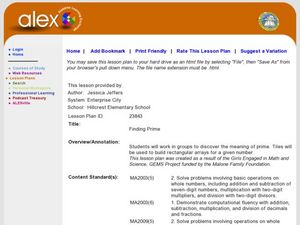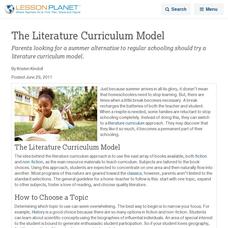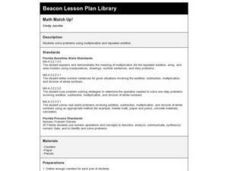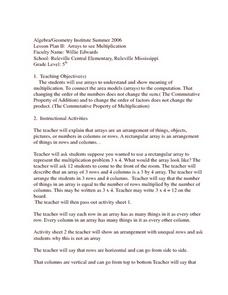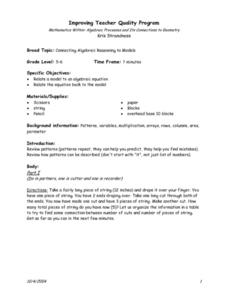Curated OER
Area Model of Multiplication Using Base 10 Manipulatives
Explore two-digit multiplication with your class as they work in groups to build models of two-digit multiplication using base 10 manipulatives. They construct rectangles replacing standard numbers with equivalent place values using...
Curated OER
Area Model of Multiplication
Fifth graders build area models to represent multi-digit multiplication. This lesson is not complete, but having pupils learn first through hands-on experiences builds a solid mathematical foundation.
Curated OER
Modeling Multiplication and Division of Fractions
Create models to demonstrate multiplication and division of fractions. Using fraction tiles to model fractions, pupils explore fractions on a ruler and use pattern blocks to multiply and divide. They also create number lines with fractions.
Pennsylvania Department of Education
Multiplication Using Arrays
Explore the concept of multiplication by using arrays. Classmates use arrays to gain a better understanding of multiplication. They break arrays apart to model the distributive property of multiplication over addition. The relationship...
Curated OER
Picture Board
Learners divide a poster board so everyone gets the same amount of area to decorate. Youngsters talk about the different ways to divide a rectangle. They measure their lines to make sure that each piece is equal and then decorate their...
EngageNY
Interpreting Division of a Whole Number by a Fraction—Visual Models
Connect division with multiplication through the use of models. Groups solve problems involving the division of a whole number by a fraction using models. The groups share their methods along with the corresponding division and...
Curated OER
Area: It's What's on the INSIDE That Counts!
Second graders participate in a series of hands-on, online and multimedia activities that examine the concept of area. They view clips from the animated series Math Monsters and discuss the purpose of area and how it is used in the real...
Curated OER
Division by Fractions (Part Two)
Investigate division through the use of array models. The lesson plan focuses on using area models to compare division as sharing with division as grouping. Students evaluate the usefulness and limitations of the two array models.
Alabama Learning Exchange
Finding Prime
Fifth and sixth graders explore prime numbers. They work with a partner to build rectangular arrays using twelve tiles. Factor pairs are noted and recorded on graph paper. Pupils construct rectangular arrays with a prime number and...
Curated OER
The Literature Curriculum Model
Parents looking for a summer alternative to regular schooling, should try a literature curriculum model.
Curated OER
Math Match Up!
Help learners solve problems using multiplication and repeated addition. Using counters, learners will be paired up to solve problems. They will go through a series of questions and show models with the counters for the solution. Then...
Curated OER
Arrays To See Multiplication
Fifth graders examine multiplication. They construct arrays to demonstrate specific multiplication facts. They identify examples and non-examples of arrays. Students use counters to model the commutative property of multiplication.
Curated OER
Working with larger arrays
Fifth graders use arrays to show the meaning of multipication in selected situations. They practice using large and small arrays. The lesson has numerous activities, which gives students more opportunities to display academic growth.
Curated OER
Complexity Madness
Discuss different techniques for finding the area of a geometric shape, with a great visual guide. Using a real life example, learners calculate the area of a rectangle and a square.
Curated OER
Measure the Gardens
Understanding arrays is very similar to understanding the relationship between multiplication and area. Give your third graders an opportunity to practice identifying area models that relate repeated addition and multiplication. They...
Curated OER
Multiplying with Packages and Letters
Learners explore multiplication. In this multiplication problem solving lesson, students view a video clip which demonstrates loading a truck with packages. Learners fill in a blank array to represent 1"X 2" and the multiples when...
California Education Partners
Lashelles Garden
Let knowledge grow bountifully like plants in a garden. Given a diagram of a rectangular garden split into plots, scholars determine the area of the entire garden and the areas of the individual plots. As a culminating activity, they...
Curated OER
Connecting Algebraic Reasoning to Models
Young scholars analyze relating a model to an algebraic equation and visa versa. Patterns are reviewed in detail and then in pairs new models are created and then translated into a word problem or equation. They illustrate their models...
New York City Department of Education
Isabella’s Garden
Create rows and rows of vegetables. Pupils use their knowledge of multiplication to find the number of vegetable shoots planted in a garden and ways to arrange the vegetables in the performance task. Teachers use the suggested unit...
Illustrative Mathematics
Comparing Products
How can 5th graders show understanding that 30 x 225 is half of 60 x 225 without completing the computation? They can use an area model and draw it out. An array, or an open array, is an area model that allows for young learners to...
Curated OER
Multiplication: Building Models, Representations and Explanations
First graders explore multiplication concepts through skip counting, repeated addition and arrays. Using animal characteristics as a context, 1st graders solve problems using mathematical tools such as hundreds charts, number lines, ...
Curated OER
The Difference of Two Squares
Learners practice the use of number properties through exploring the difference of two squares, creating an array model for multiplication, and work with decimal numbers. In groups, students explore patterns in an array and determine...
Discovery Education
Sonar & Echolocation
A well-designed, comprehensive, and attractive slide show supports direct instruction on how sonar and echolocation work. Contained within the slides are links to interactive websites and instructions for using apps on a mobile device to...
Curated OER
Sinking Races
Young scholars build plankton models and compete to see which sinks most slowly. They write, or orally present ,the adaptations they incorporated to slow the sinking rate of their organisms. Race results can be grounds for some prizes!


